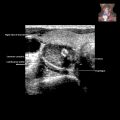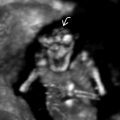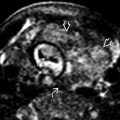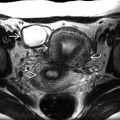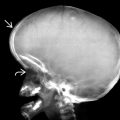KEY FACTS
Terminology
- •
Membranes insert on fetal surface of placenta instead of along edge
- ○
Edges not “tacked down” & curl away from uterine wall
- ○
Imaging
- •
Edge of placenta is rolled toward center
- ○
Amniotic fluid gets between rolled-up edge & placenta
- ○
- •
Turning longitudinally creates band or shelf appearance
- ○
Edges of shelf attach to placenta
- ○
- •
Cord insertion may be normal or marginal (vessels on edge)
Top Differential Diagnoses
- •
Many things create intrauterine linear echogenicities (ILE)
- ○
Key is to look where they attach
- ○
- •
Synechiae (amniotic sheets)
- ○
From uterine scar (covered by membranes)
- ○
Thick membrane attaches to uterine wall
- ○
Placenta may implant on synechiae
- ○
- •
Amniotic bands
- ○
From rupture of amnion
- ○
Thin membrane entangles fetus &/or umbilical cord
- ○
- •
Septate uterus (uterine duplication anomaly)
- ○
Septum is always at fundus
- ○
- •
Marginal placental abruption
- ○
Placental edge is lifted because of associated hematoma
- ○
No placental shelf
- ○
Clinical Issues
- •
Excellent prognosis if partial & isolated
- •
↑ incidence of preterm delivery, abruption, growth restriction (if most or all of placental margin is involved)
Scanning Tips
- •
Look for sites of attachment whenever ILEs are seen
- •
Make sure fetus & cord are not involved with ILE, which would indicate amniotic bands
- •
Look for placental shelf when edge looks free floating

